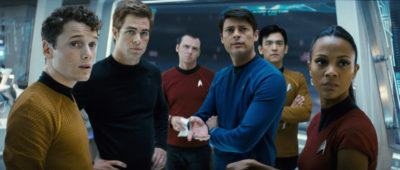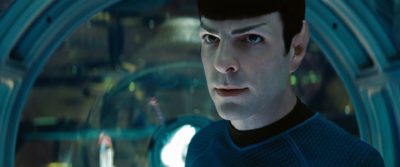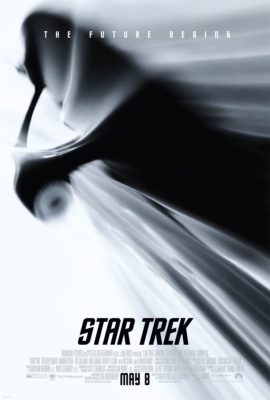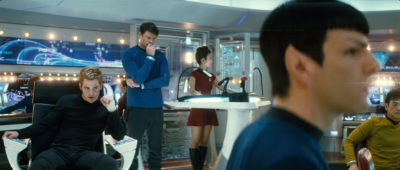In anticipation of Star Trek Beyond we’re taking a look back at the Star Trek film that kicked off the Kelvin Timeline! For our thoughts on Into Darkness, check out our initial review when the movie was released, and our follow-up article “Is Into Darkness Really ‘Star Trek?'”
Re-starting and re-booting a franchise as important and unique as Star Trek is a pretty difficult task, and we think JJ Abrams and company did a very good job. Our rating for the 2009 Star Trek film is 8 out of 10.
As a reminder, we’re using a different scale for our movie reviews (out of 10 rather than being out of 5), and we’ll eventually rank them all.
CHARACTERS
From the very beginning it seems that the focus (aside from providing an action filled blockbuster, of course) of the 2009 Star Trek film is the emotional core of the primary characters. In the thrilling and occasionally melodramatic opening sequence we see the birth of James Kirk and the death of his father, whose lives overlap only by a few minutes. The loss of Kirk’s heroic father shape the journey not only of this movie, but this whole new leg of the Star Trek franchise.
 We’re introduced to both Kirk and Spock as children and their lives are pretty clearly defined for us. The early Spock sequence is particularly effective, showing the nuances of Vulcan culture and expectation in a short amount of time. The difference between Kirk and Spock is a primary thread of the movie – Kirk must come to terms with the legacy of his father and if he can step into that legacy, while Spock must navigate the line between his two cultures to define himself. The two personalities clash, sometimes violently, in their differences. Sometimes the fighting between Kirk and Spock in this film can be a bit grating, and sometimes the confrontations feel forced, like when Kirk has to try and make Spock fly off the rails to regain control of the ship.
We’re introduced to both Kirk and Spock as children and their lives are pretty clearly defined for us. The early Spock sequence is particularly effective, showing the nuances of Vulcan culture and expectation in a short amount of time. The difference between Kirk and Spock is a primary thread of the movie – Kirk must come to terms with the legacy of his father and if he can step into that legacy, while Spock must navigate the line between his two cultures to define himself. The two personalities clash, sometimes violently, in their differences. Sometimes the fighting between Kirk and Spock in this film can be a bit grating, and sometimes the confrontations feel forced, like when Kirk has to try and make Spock fly off the rails to regain control of the ship.
This is one of the biggest differences between the classic Star Trek universe and the JJ Abrams approach. Emotions are big and on display, driving the stories in a significant way. Previous Trek, especially The Original Series, kept everything pretty professional. In the TOS movies there is some great insight into the characters we love, but it’s not given a lot of screen time, at least compared to this film.
One of the (small) disappointments of the movie is that the thematic trifecta of Kirk/Spock/Bones is a little lost because of the centrality of Kirk and Spock. The dynamic between the characters is certainly there, it just isn’t able to occupy the spotlight in the way we might expect.
The whole cast is fantastic, it should be said. There’s a great balance in the performances – some, like Anton Yelchin’s Chekov, play with a slightly silly nod to the original. Zoe Saldana takes little from Nichelle Nichole’s portrayal of Uhura, but that isn’t a bad thing – everybody in the cast doesn’t need to do the uncanny summoning of, and homage to, the original portrayal of a character the way Karl Urban does for DeForest Kelley’s Leonard McCoy.
PLOT
The broad strokes of the plot are pretty clever: In the ‘current’ prime universe timeline Romulus is destroyed. A simple Romulan miner named Nero is pursued by Spock into the past, changing that past in drastic ways and sending this new timeline into very different territory. The young versions of the characters we know must, with some assistance from Prime Spock, stop Nero from getting any further along in his grief-driven path of destruction. It’s a nice way to get us into this material without totally ditching the universe we know and love.
There’s a lot of shaky stuff in the details, however. Kirk lands in the captains chair in an almost believable string of events. Nero flirts with genuine motivations, but gets too lost in convoluted narrative requirements and limited screen time to seem fully realized. There are plenty of smaller ‘plot holes’ and inconsistencies, but I generally don’t bother with those unless the movie isn’t working as a whole or the problem is immediately distracting. One such situation does pop up that’s worth mentioning: Kirk and Spock have their first really big disagreement with how to proceed after the devastating destruction of Vulcan. Kirk is incredibly insubordinate and Spock has him removed. However, with basically no explanation, Spock not only has him removed from the bridge, but also from the ship. It becomes obvious pretty quickly that the only reason Spock takes this kind of insane action is because the rest of the story hinges on Kirk running across Prime Spock and getting a bunch of information he and the audience needs. It’s all very clumsy writing, and it feels that way as it’s playing out.
 In conclusion, the whole movie hangs together because of the attention to character, the thrilling action sequences, and the spot-on production design and music. It’s pretty cool to see this level of craft and budget applied to the world of Star Trek!
In conclusion, the whole movie hangs together because of the attention to character, the thrilling action sequences, and the spot-on production design and music. It’s pretty cool to see this level of craft and budget applied to the world of Star Trek!
MISC. DUMB STUFF
• During the Kobayashi Maru test the way Kirk cheats is so obvious I have to wonder what exactly he thought was going to happen. Also I sure don’t like the way he’s eating that apple.
• The medical hijinks that result in Kirk having balloon hands is as stupid as the phrase “Kirk having balloon hands” would suggest.
• Scotty getting shot around big clear water pipes inside the bowels of the Enterprise after a transporter miscalculation was very silly.
MISC. COOL STUFF
• It’s a fine line, but I think the opening sequence is really effective in it’s emotional punch. Part of the reason it all works so well for me probably has a lot to do with the entire sequence being staged really well. The Captain of the Kelvin seems cool and I was immediately invested in him, the destruction of the Kelvin was terrifying, so by the time papa Kirk is naming his child as he goes down with the ship I was totally locked in.
• Another big part of that is THE SCORE. Man I love the music in this by Michael Giacchino. I think the new Star Trek theme is one of the best contemporary movie themes.
• The moments with Leonard Nimoy all really clicked. That could’ve easily gone badly but I found it all very affecting.
• I also thought Bruce Greenwood as Captain Pike was great.
• I like how wild and desperate Eric Bana’s delivery of the line “Fire everything!!” is.
• All the costuming and set design is fantastic as well. The visuals really reinforce the optimistic view of the future central to Star Trek. The bridge looks wonderful (even if the shape of the space is a little ill-defined) and all the sound design is amazing. I think the costumes are pretty much perfect as well. In an age where costuming, even in big sci-fi adventures, is almost entirely colorless and dark, getting the bright pops of color is both in keeping with the sharp design of the original series and a smart choice to make this film feel different from the frequently drab blockbuster visuals audiences usually have to endure.


